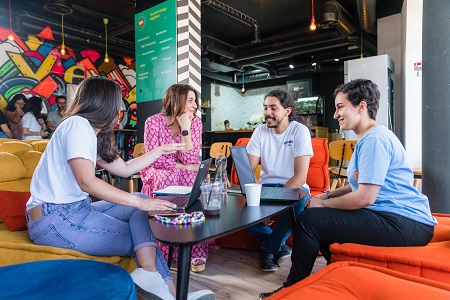Pilot project “Recovery & Stabilisation in the Central African Republic”: Focus on Berberati
Restoring State presence in the regions
One of the project’s main objectives was to support the redeployment of decentralised services, in order to contribute to restoring the State’s authority in the regions.
In Berberati, training sessions have built the capacities of the administrative authorities (prefects, regional directors, heads of prefectural services…) in administrative ethics, the management of administrative services… The priority was to give State civil servants and officials the keys to manage decentralised bodies effectively and transparently.
This human component has been combined with an infrastructure dimension, as administrative buildings have been built or rehabilitated and equipped. Public utility infrastructure (abattoir, cattle market…) has also been renovated. It is also in the prefecture of Mambéré Kadeï that one of the first steel bridges will be installed. They have been donated by the French State to CAR in the context of the project to open up regions in the Central African Republic. The project aims to rehabilitate transport infrastructure in certain isolated municipalities which have strategic areas and will thereby open up regions.
Promoting dialogue and the involvement of society
The project also aimed to work on community dynamics and strengthen social cohesion in order to contribute to mitigating the social consequences of the crisis in 2012-2013.
Awareness-raising activities were consequently conducted to deconstruct intercommunity stereotypes. “Sensitising officers” were trained in the context of activities on transitional justice. The roles and responsibilities of community leaders towards their fellow citizens have been strengthened (capacities to manage the daily administration of a neighbourhood/village).
The NGO Lawyers Without Borders Belgium, a partner of the project, also provided support to actors working on access to law and justice, with a focus on alternative modes of dispute resolution, to reduce recourse to private justice.
Again with this objective of awareness-raising and dialogue, a play entitled “Kete kodro, kota kodro” has been produced in partnership with the Alliance Française in Bangui. It addresses subjects concerning the redeployment of the State in the regions and issues related to citizenship and living together. A tour was organised with a troupe of 3 actors from CAR in region n° 2. A total of 15 performances were given with an average audience of 500 to 600 people. There was a positive reception and the play gave rise to lively discussions over the project issues.
Finally, local radios, the major channel for disseminating information to the entire population, were also involved. In the aftermath of the crisis, their action was limited by a lack of financial, material and human resources. The French operator CFI, in partnership with the Community Radios Association (ARC), therefore assisted them with training – for example, on conflict-sensitive journalism – and on the production of programmes, as well as by supplying and installing important equipment to improve their production capacity, ensure the dissemination despite electricity problems and extend their coverage area.
A lire aussi : Zukpana devient radio régionale !
In early May 2019, the capitalisation workshop will gather all the stakeholders involved in the implementation of this pilot project. The aim is to discuss the outcomes and impacts and learn lessons on how to support initiatives related to governance and local development in isolated areas.
 For further reading: Zukpana becomes a regional radio
For further reading: Zukpana becomes a regional radio




